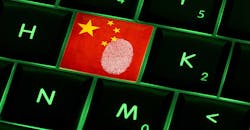The U.S. on Tuesday accused China of continuing a state-backed campaign of intellectual property and technology theft even as the world’s two largest economies have descended into a tit-for-tat tariff war.
The new accusations came in a detailed 53-page report released by U.S. Trade Representative Robert Lighthizer’s office just 10 days before President Donald Trump is due to meet Chinese President Xi Jinping on the sidelines of a Nov. 30-Dec. 1 Group of 20 summit in Buenos Aires.
The timing of the report’s release appeared to be a move by some of the more hawkish members of Trump’s administration, such as Lighthizer, to bolster their case ahead of the summit and as other cabinet members such as Treasury Secretary Steven Mnuchin push for a resumption of negotiations.
“China fundamentally has not altered its acts, policies, and practices related to technology transfer, intellectual property, and innovation, and indeed appears to have taken further unreasonable actions in recent months,” the report said.
In the report the U.S. accused China of continuing a state-backed campaign of cyber-attacks on American companies that were both intensifying and growing in sophistication.
In response to questions about the USTR report, a spokesman for China’s foreign ministry on Wednesday said U.S. officials should read a white paper published by the government in September that claims China ‘firmly protects’ intellectual property rights.
China Telecom
As an example, it cited an October 2018 report by experts from the U.S. Naval War College and Tel Aviv University that found that China Telecom may be engaging in a "malicious" campaign to "hijack Internet traffic and direct it through Mainland Chinese servers for possible collection and analysis.”
The report accused China of responding to the U.S. government’s concerns over its “Made in China 2025” policy to lead the world in sectors such as artificial intelligence and robotics by waging a propaganda campaign to play down its significance rather than making substantive changes.
“Despite this transparent attempt to de-emphasize Made in China 2025 in public, China continues to implement this industrial policy on a large scale,” the report said.
According to the updated USTR report, Beijing had made only incremental changes to its restrictions on foreign investment in certain sectors in China since the U.S. first released an original March report used to justify the tariffs on $250 billion in Chinese imports imposed by the Trump administration.
The report also said while Chinese foreign-direct investment in the U.S. had fallen in 2018, there were signs that it was becoming more focused on the sort of tech startups that the Trump administration was eager to protect. “In particular, Chinese [venture capital] investment in U.S. technology centers such as Silicon Valley has intensified in recent months,” its authors wrote.
G-20 Agenda
Derek Scissors, a China expert at the conservative American Enterprise Institute, said the report’s release appeared to be an effort by Lighthizer to influence negotiations ahead of the G-20. “USTR is trying to take some issues entirely off the table for the G-20, in case the Chinese want something in exchange for ‘canceling Made in China 2025’,” Scissors said.
A USTR official told Bloomberg that the report’s release on Tuesday was meant only to document China’s continuing practices and indicated the U.S. still hopes to make progress at the G-20 summit.
"This reflects the thinking of the hawkish in the Trump’s trade team, and they are trying to raise their concerns," said Henry Wang, at the Center for China and Globalization, a Beijing-based think tank. But there are also the dovish voices like Mnuchin and Kudlow, so this is not necessarily going to derail the summit, he said. "What’s important is what the two leaders will say. That will eventually set the tone," Wang said.
Larry Kudlow, the head of Trump’s National Economic Council, said on Tuesday that the two sides were engaged in continuing discussions ahead of the G-20 meeting and that Trump believed Beijing was interested in a deal.
“He believes that China would like to have a deal," Kudlow said in an interview with Fox Business Network on Tuesday, adding that “very detailed communications” were taking place at all levels of government.
By Shawn Donnan and Jenny Leonard
About the Author
Bloomberg
Licensed content from Bloomberg, copyright 2016.
